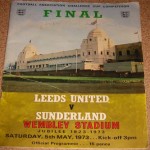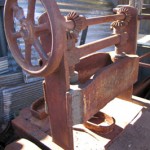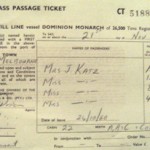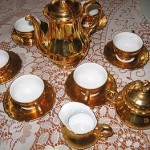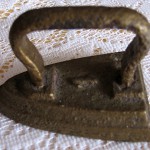(nee Ellis)
English
Cornwall, England
England in June 1954
Sydney in July 1954
Fairbridge Farm School village & farm, Molong, NSW (child migrant scheme near Orange) for 10 years
Farm property near Condobolin, New South Wales
Fairbridge Farm agricultural/domestic trainee
House cleaner on rural property; egg collector for Inghams’ and children’s nurse in SW Sydney; cleaner at Orange Base Hospital.
At six months my mother died and I was put in a home in England, in Cornwall [with] my two older brothers. [My father] was still around, he didn’t want us. Didn’t want me anyway, I’ve been told. My brothers said Dad used to come and see them when we were in Cornwall. I don’t remember it, I was too little.
I came out here [to Australia ] when I was seven. My brothers are older than me by one and two years. [Fairbridge] asked anybody if they wanted to go on a holiday and my brothers said they did and were taking me! I didn’t know the holiday was going to be to Australia. It was the longest holiday in the world! That’s a party of all of us when we come out from England. [The photo] was taken before we left England for Fairbridge. Miss Shirley Deck was supposed to be escorting us. We had to go to school when we were on the ship. My brother used to nick off all the time.
It was only school I remember. My brother remembers getting a penknife. You know, these people used to come in boats from Saudi Arabia or wherever. They pulled up and, weren’t allowed on the boat. Paul said he wanted a knife and the guy said to send the money up first. Paul is saying to send the knife. So he sent the knife up and then [Paul] took off with the knife! He didn’t give the bloke any money ‘cause he didn’t have any!
The journey took six weeks and the boat landed in Sydney. It seemed to be a long, long trip to Molong [in central-west NSW]. All I remember was Fairbridge [Farm] and it looked like it was the end of the world. Awful. I mean imagine coming [from] Cornwall, there’s places everywhere. They decided to dump all these kids out in the middle of nowhere. We were told what house we were going in. I was in Lilac [Cottage], my brothers were in Orange. It was pretty traumatic [being separated] but Anne Barlow [who was on the ship] was in the same cottage as me. She looked after me a lot.
You had all this stuff you had to do every day. It was a real workhouse. We were only little kids. We used to have to get up early every morning and clean the whole cottage, then go down to the dining room and work, work, work. Every day we worked. Depending on your age, boys had to go to the dairy or the vegetable garden or the chooks. Girls, they assumed, wanted to be housekeepers, so they had to do the laundry or help the cook and do the washing-up.
The staff were very violent. Most of the staff were sadists and some of them liked to sexually abuse the girls. Physically, mentally, whatever. Very violent. I was basically told from as long as I can remember that I was out here because I had killed my mother, which isn’t true of course ‘cause my mother died of cancer, which I found out [later]. But when you are only a kid and some idiot tells you that, of course you are going to believe that, aren’t you? [Fairbridge] used to have mini Olympic Games. My brothers were good runners. Playing hockey was good too. Take a lot of frustration out on the ball.
Oh the ribbons, that was from horse riding. They’re for different competitions. I know the red one is [for] second and the blue one is supposed to be first. I assumed the other ones are third or fourth, something like that. The principal’s daughter had this horse [and] I used to ride [it] sometimes. They had a pony club in Molong so it was a good outlet, a good way of getting out from things you had to do [at Fairbridge]. I had a trip to Sydney when I was 12. [Fairbridge] had this teeth competition and I won the girls’. I went to the town hall and had to stand up on this big stage. There was heaps of people there, it was pretty scary, but anyway they gave me this money, £30. [Fairbridge] were going to look after it for me and they did. I didn’t get [the money] but they sure looked after it.
Fairbridge had their own school. Crummy, yeah, they didn’t teach you a lot. I think they had it that we were just dumb people, you know, and when you got older you went to Molong School. All I remember at Molong School was fights. My reading and writing is pretty poor. My spelling is still not as good as I would like it to be. One of my brothers still thinks he’s dumb because he has been told that all the time. They automatically thought we were all dumb.
They assumed you couldn’t go to school anymore ‘cause you weren’t that smart, so you had to do this traineeship. With girls it was in the laundry or in the kitchen or doing the principal’s house. Just rotten jobs. Just working, working, working all the time. It’s just constant. And you did that for about two years [at] 14, 15, 16. When you got to 17, they got you a job and told you where you were going to work. They always treated girls as second rate citizens. You didn’t want to work out on a damn farm but they assumed all this.
Do you know, I left Fairbridge with two sets of clothes, two sets of towels, no money. What were we supposed to do? I’m not sure what the wages were, [but] if you made, say, £10 which you wouldn’t have, but if you did, you had to send half of it back [to Fairbridge]. Why? Because that was for your keep for whatever many years you were there.
I was sent out to a farm, 30 minutes from the closest town [to] clean the house. I found it very difficult, I didn’t know how to communicate with people. I always thought I was inferior to everybody because I had always been told it. I remember going to this woman’s house where they sent me and she had visitors, so I just ran outside. I thought that was the way. We weren’t allowed to be seen with other people. It was very, very hard. And to be stuck way out in the middle of nowhere was harder. [But the family] were lovely. That made a big difference. They used to buy me clothes and just their whole attitude towards a lot of things, I have to give them credit for that. I mean, just to go shopping [with them] was like, wow. But to be stuck out there, you got to realise that most of the Fairbridge kids had been with people all their life. We were used to being in the dormitory where there was about 16 kids. Then you’re suddenly you’re pulled out, stuck out there and there’s nobody. You’re talking to yourself. Of course it was lonely.
I left the farm at 21 and got married. Worst mistake I ever made. My husband, I think, he just came into the town. I was looking for somebody to love me and just accept me and not want me to be something else. Along came this guy and when I first met him, he was like Prince Charming. And I was ‘green’, I didn’t know anything about relationships. Didn’t even know what girls should know at that age.
He was a very violent man. Very jealous, very violent person. Put me in hospital more times than I care to mention. I lost I don’t know how many babies. Unbelievable. Put a shotgun up to my head, very violent. He didn’t like me working. He used to do a lot of ‘midnight flutters’ – a person owes a lot of money and they don’t pay their bills they get up and run away. That’s what he used to do. We ended up going near Taree. His family used to be there and we ended up living with them. His mother was an absolute fruitcake. It sounds absolutely bizarre, but because he was so violent and [his mother] used to sit outside the door at night so I wouldn’t leave the house, I had had enough and ended up crawling through the window and stealing his ute and taking off.
I went to my sister’s place in Ingleburn, in Sydney. My sister came out a few years later [to Fairbridge] when she was about 16. It was like having a total stranger because I didn’t know her. I remember them telling me my sister was coming out and I said, “I don’t have a sister”, because I hadn’t really heard of her before. Well, I knew I had to find a job. I went to work for Ingham’s chooks which was, if you like chooks chasing you all the time, pretty good. Just collecting the eggs. I don’t really care what I do as long as they pay me.
I was working at Glenfield Park School for intellectually handicapped kids. I ended up being a nurse there which was very rewarding but it does get you down after a while of course. Because I used to know people in Condo[bolin], I went back there one Christmas and that’s where I met my husband now. He had three children so I am an absolute mad woman. Marry a man with three children, then having another one?! He owned a big property the other side of Condo, which is about 40,000 odd acres, so that kept us busy. We moved to Orange about 14 years ago when my two youngest daughters [came here]. Best move we ever made because I like Orange, I like the climate. When I first came, I tried to get back into working with disabled kids and some idiot around here said there wasn’t any jobs. The only ones that would give me a job at that stage was the hospital as a cleaner. I’m not a person who really shies away with what I do as long as they pay you. Then I had a bad fall and hurt my knee. I have an artificial knee and a pacemaker so I don’t work at all now. I go to the gym four days a week and spend a heap of time with my family. My eldest brother gave me those two [photos] many, many years ago when I was still at Fairbridge. I have kept them all these years. I had no idea who they were until ten years ago, the first time I went back to England.
I wrote to a social worker in Nottingham, England. I was pretty sure my mum didn’t have any family or this is what I was told. It just about threw me [when] she said Mum had two sisters ‘cause I wasn’t expecting anybody and then I met Deanna, my cousin.
I showed her the photos and asked who they were. And she said, “They’re your parents”. How dumb do I feel, huh? Not many people carry photos around and don’t know who they are. Deanna told me [my father] remarried and had another daughter. So it was a bit of a shock for [my half-sister] because she didn’t know about us either until I went back two years ago. It’s a bit overwhelming, but as for my half-sister, I feel for her because the first time the social worker was evidently talking to her mother and she said she didn’t want her daughter to have any contact, but my half-sister visited [Australia]. I wanted to show her where Fairbridge was. Everything was so tiny! I always thought it was huge. I cannot believe how many children were crammed into the same dormitory. I’d never been in the buildings since I left in 1964. It brought back really bad memories. The abuse and everything. I had a really rough time. It was just like walking back into yesterday.
My father died in the late 1960s. It’s only since we found my half-sister that we found out he’s been dead a few years. I didn’t have a clue. He promised my eldest brother he would come out [to Australia ] and gave [him] a photo of the Queen. He said to look after it [and] gave his word that he would come out. He never did. My brother only ripped it up a couple of years ago – it’s not the Queen he ripped up, it’s because he gave him his word. Basically, that’s what I’m like too if you give me your word.
[Fairbridge] wasn’t a very nice place to grow up. I have never actually kept friends with other Fairbridge kids except for a few people around here. I have tried to forget a lot of it [and] I want to centre more around my family. It just upsets me. It just makes me too angry, you know. No adult person came out and stopped it. No adult stood up for us and still aren’t.
Interviewed by: Andrea Fernandes, NSW Migration Heritage Centre on 6 February 2007 With assistance from Ian “Smiley” Bayliff and David Hill.
Visit the Fairbridge Heritage Project page for information on the CD-rom, The History Of The Fairbridge Settlement, Molong, by Ian “Smiley” Bayliff and David Hill and the publication, The Forgotten Children, by David Hill.


![Jan Barby with her horse riding ribbons (early 1960s) "They're for competitions. I know the blue one is supposed to be first [prize]. They had a pony club in Molong so it was a good way of getting out from things you had to do [at Fairbridge Farm]."](../../../cms/wp-content/uploads/2008/08/photo21.jpg)
![Leaving party of Fairbridge Farm children, Knockholt, Kent, England 1954 (Jan Barby is in the front row with her brothers on either side.) "That's a party of all of us when we come out from England. It was taken as we left, before we left England for Fairbridge. The other female in that photo, Anne Barlow, looked after me a lot [at Fairbridge Farm]."](../../../cms/wp-content/uploads/2008/08/leaving1.jpg)
![Jan Barby's parents, Cornwall, England, c. 1940s "My eldest brother gave me those two [photos] many, many years ago when I was still at Fairbridge. I had no idea who they were until ten years ago [when] I took them to England and found my cousin. She said, "They're your parents".](../../../cms/wp-content/uploads/2008/08/parents.jpg)
!["I had a trip to Sydney when I was 12. [Fairbridge Farm] had this teeth competition and I won the girls'. I went to the town hall and they gave me this money, £30. [Fairbridge] were going to look after it for me and they did. I didn’t get [the money] but they sure looked after it."](../../../cms/wp-content/uploads/2008/08/photoframe-150x150.jpg)
!["They're for competitions. I know the blue one is supposed to be first [prize]. They had a pony club in Molong so it was a good way of getting out from things you had to do [at Fairbridge Farm]."](../../../cms/wp-content/uploads/2008/08/ribbons-150x150.jpg)
